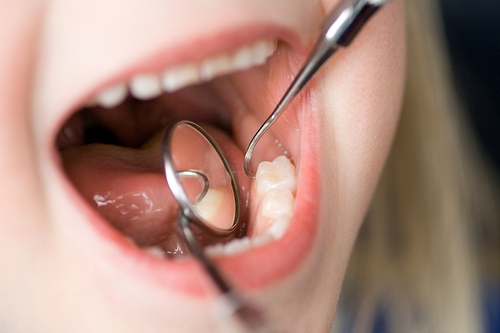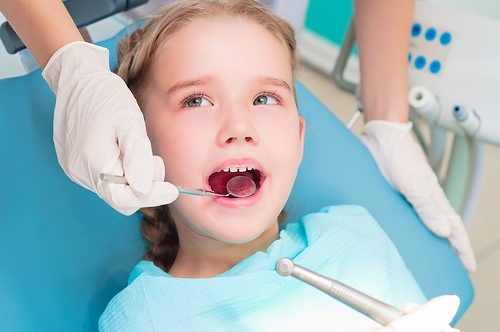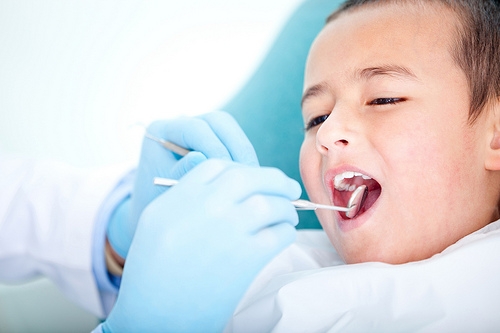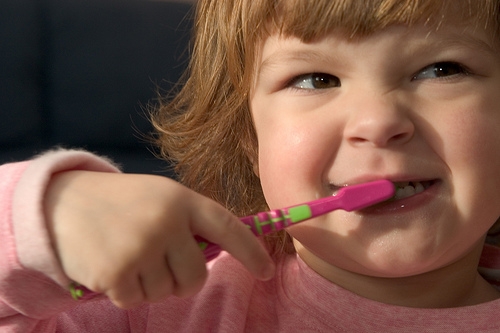About Our Office
Beat the Brushing Battle
November 8th, 2013

Dr. Craig S. Donn and our team know it can be a challenge to get our children to brush, brush well, and brush often. Here are some tips that can help you keep those beautiful little teeth healthy.
Make it Fun, Make it a Habit!
We should all brush twice a day. The most important time to brush is at night before bed. When we sleep, our saliva production decreases, and this creates an environment for oral bacteria to cause greater destruction to our teeth and gums. Brushing should last at least two minutes, followed by flossing and mouthwash if you choose.
Here are some ideas to make this nightly ritual more entertaining.
- Set a good example. Brush your teeth with your children and make it fun! Pick a song to play while brushing.
- Make it a race to the bathroom to see who can get their toothbrush and floss ready. But don’t make it a race to finish; make sure brushing lasts at least two minutes.
- Try using a sticker sheet. For every night your children brush well, give them a sticker. (Be sure to check their work.) After a certain number of stickers, they earn a reward. Let them pick the reward! As the child improves at brushing every night without reminders, you can wean her or him from the reward.
- SPECIAL TIP: Let your child check your brush work!
As parents, we should help our children make health and wellness something to take pride in. Be gentle with your children when they make mistakes, whether forgetting to brush or maybe developing a cavity. Tell them even our team at our office get cavities. Thankfully, there is always room for improvement. Happy brushing!
Providing the Right Dental Care for your Children
November 1st, 2013

You already know that our office recommends you come in for a checkup and cleaning at least every six months, but do you know what your child’s dental needs are? From the time children are babies and growing in their first teeth, their oral health care needs may be different from adults. It’s important to know what they need, and when, to help them grow strong, healthy teeth.
When to See Our Team at our office
While dental care (at home) can begin as soon as your baby starts to show signs of that first tooth, most experts do not recommend you see a dentist until your child is at least one year old. The child will likely be too young at this point to have a full dental exam, but we can take a look at your baby’s teeth and give you tips for brushing and flossing properly.
By the time your child has all of his or her baby teeth—usually around 24 to 30 months of age—we can begin scheduling regular checkups and cleanings.
What to Expect on the First Visits
The first visit to our Cherry Hill, NJ office for a full exam will mostly involve getting to know Dr. Craig S. Donn and staff members, and making your child feel comfortable. Let us know if you would like to sit in the exam room during the appointment, but keep in mind that it may be beneficial to leave your child alone with Dr. Craig S. Donn for a portion of the appointment so we can start building trust with your child.
Our team at our office will likely do some or all of the following during your child's visit:
- Look for signs of decay or other tooth or gum problems
- Examine your child’s bite, checking for misalignment that could lead to problems in the future
- Clean the teeth, and apply fluoride if your child is old enough
- Talk to you about proper oral health care for your children
- Answer any questions you may have about caring for your child’s teeth, which may include topics like fluoride needs, nutrition and diet, teething, and the frequency of future checkups
In most cases, we will recommend that you bring your child in every six months for regular checkups, the same as your recommended frequency.
Understanding your child’s unique dental needs is important for providing the best possible care when it becomes necessary. We look forward to building a good relationship with your child so coming to the dentist is a fun, rewarding experience and not a frightening one.
Halloween - Candy, Costumes, and More!
October 25th, 2013

All Hallows' Eve, more commonly known as Halloween, is a yearly event celebrated on October 31, and one that is anticipated by the young and young at heart all over the world. Some scholars claim that Halloween originated from Celtic festivals that honored the dead or that celebrated the harvest, while others doubt that there's any connection at all to Samhain (a Gaelic harvest festival.) Regardless of its origin, our team at the dental office of Dr. Craig S. Donn hope that Halloween is fun and enjoyed by all of our awesome patients!
Trick or Treat?
In North America, Halloween is predominantly celebrated by children who dress up in costumes, which range from scary to cute, who then go around the neighborhood knocking on doors asking "trick or treat", and they are given candy in return. Trick-or-treating is a time honored tradition, and though many parents groan at the pounds and pounds of candy collected by youngsters and fear for the health of their teeth, there are a few things you can do to help their teeth stay in great shape until the candy is gone:
- Limit the amount of candy they can consume each day
- Have them brush their teeth after eating candy
- Avoid hard, chewy candies as they can stick in hard to brush places
- Keep candy out of sight to reduce temptation
- Don't buy candy too far in advance to limit pre-Halloween consumption
- Help or encourage your children to floss
Halloween Fun
Halloween isn't just about gorging on candy; there are other events associated with this festive day including carving jack-o'-lanterns, painting pumpkins, decorating sugar cookies, bobbing for apples, going to haunted houses, or just curling up on the couch with a bowl full of popcorn and watching some classic, scary movies.
Halloween Around the World
Some countries, like Australia, frown upon Halloween, claiming it is an American event and not based in Australian culture, while others like Italy have embraced the fun and celebrate much as Canadians and Americans do. Mexicans have been celebrating this fun day since around 1960, and it marks the beginning of the Day of the Dead festival. Some countries in Europe have come late to the party, but since the 1990s, countries like Sweden, Norway, and Germany have started celebrating Halloween as well, and finding children in costumes or having ghosts hanging in windows has become commonplace.
Halloween is about fun; stepping outside our normal lives and donning a costume or gathering with friends to knock on doors and ask for candy is as much a part of our culture as hot dogs and barbecue on Labor Day. Have a safe and happy Halloween from the team at our office!
What is Biofilm?
October 18th, 2013

Biofilm, protective housing for bacteria, is a hot topic in the medical and dental fields. Routinely taking an antibiotic for a bacterial infection has become more complicated because of biofilm. Bacterial infections may become resistant to antibiotics in part because the biofilm allows for communication among the bacteria, allowing the infection to be sustained.
You’re probably wondering, Dr. Craig S. Donn , what does this have to do with teeth? Since we’re dental professionals, we can tell you why it’s important and what you should know! There is biofilm in your mouth; healthy biofilm and diseased biofilm. Both are made of the same general compounds, but when combined with certain amino acids and cellular chemicals, the diseased biofilm conquers and destroys.
Periodontal disease, otherwise known as gum disease or pyorrhea, is a biofilm disease. If you are undergoing treatment for gum disease and you do not continue with the treatment plan the disease will progress and/or spread due to the biofilm.
There are several ways to treat diseased biofilm. But remember, antibiotics cannot touch the bacterial infection if the biofilm is established.
When your regular cleaning exam is complete, the Ultrasonic or Piezo Scaler should be used. This method of spraying water disturbs the biofilm and provides an opportunity to treat the infection causing bacteria.
Remember, we all need healthy biofilm. Just as your skin protects your body, biofilm housing good bacteria protects your body. The bacteria in the biofilm replicate every twenty minutes. If your body has healthy bacteria, low levels of hydrogen peroxide are produced by the biofilm, preventing harmful bacteria from residing. Harmful bacteria do not like oxygen.
At your routine exam the dental hygienist will take measurements around your teeth checking for “pockets”. The higher the number, the deeper the pocket giving more room for harmful bacteria where there is no oxygen. Ask what your numbers are and be involved in restoring your healthy biofilm.
The Thumb-Sucking Habit
October 11th, 2013

At our office, we are often asked “should I be concerned with my child’s thumb sucking?” So, our team thought we’d share what our thoughts are on your child sucking his or her thumb.
Infants Who Suck Their Thumbs
As infants begin experimenting with the basic functions of their mouths, from sucking on a bottle to beginning to speak, it is natural for them to suck their thumbs. Parents with young babies who regularly suck their thumbs probably don’t need to feel overly concerned, so long as fingers are kept clean and the habit is kept in check. For most children, the exploratory stage of thumb-sucking ends after just a few short years. Problems with thumb-sucking occur when infants grow into young children but the habit has not been resolved.
Dangers of Thumb-Sucking
One of the main differences between an infant and a child sucking his thumb is the formation of the mouth and teeth. An infant’s mouth is barely beginning to grow and develop, so sucking a thumb might actually help to stimulate the process. For a child with a mouth full of teeth, however, a thumb-sucking habit might cause some serious problems. As a parent, it can be very important to watch your child carefully to make sure the sucking habit is regulated.
As a child grows and develops, baby teeth begin to fall out. A child sucking his or her thumb during the baby teeth stage may not run any great risks. Our team at our office often sees that once a child has developed his or her permanent teeth, the problems with thumb-sucking can become more serious. KidsHealth.org states that children who suck their thumbs beyond the age of four or five might increase their risk of developing an overbite, infections, and other dental problems.
What You Can Do To Help
Parents who want to prevent possible problems for their child would be wise to begin preventive care early on. While you don’t need to be overly concerned about an infant sucking a thumb, it might be a good idea to help your toddler break the habit before permanent teeth begin to show.
- Try to use positive rewards for good behavior instead of negativity or threatening behavior.
- Talk openly with your child about the potential dangers of a thumb-sucking habit.
- Help your child find other productive things to do with the hands as a means of distraction. Playing a game of blocks, for example, might be a great diversion.
- Support and encourage your child while he or she is trying to break the habit.
As children develop, they have many things to learn and to think about. By understanding a few simple facts about thumb-sucking, you can help your child develop in a healthy and positive way. If you have any other questions, feel to contact us at our Cherry Hill, NJ office, or ask Dr. Craig S. Donn during your next appointment!
What's on your fall reading list?
October 4th, 2013

How better to spend the fall months than inside by the fireplace with a warm cup of cider and a book in hand? Dr. Craig S. Donn and our team at our office encourage you to warm up your mind this fall season with a few great books. Sure it may be easy to put off reading when balancing a hectic schedule, but reading is vital to brain development. Besides, reading is always a blast!
This week, we thought we’d ask what you or your child are reading this fall. Do you have any suggestions for must-read books this year? Out of ideas for great fall reads? Ask us for suggestions, and we would be happy to provide a few. You may also ask a local librarian here in Cherry Hill, NJ for some ideas.
Happy reading! Be sure to share with us your fall picks or your all-time favorites below or on our Facebook page!
Treatment and Diagnosis for your Child’s Teeth Grinding
September 27th, 2013

The habit of grinding teeth can be both painful and harmful for your children. If you discover that they are frequently grinding their teeth—a condition called bruxism—here is some helpful information on the problem, and how you can find help to put a halt to it.
How to Know if Your Child is Grinding
Sometimes, identifying a child that grinds teeth is as simple as checking in while he or she is asleep. At other times, you may not be able to readily identify the grinding problem. A few of the most common symptoms associated with bruxism include:
- Frequent teeth grinding or clenching of the jaw (in some cases it may be more subtle; in others it may be loud enough that you can hear it)
- Teeth that are worn down
- Complaints of sensitive teeth
- Pain or tightness in the jaw muscles, or an earache or other jaw pain
- Frequent unexplained headaches
In most cases, if your children are grinding their teeth, they will do it at night. If the teeth grinding is a result of excessive amounts of stress, it may also happen during the daytime. Some of the most common reasons children grind their teeth involve:
- Improper alignment of top and bottom teeth
- As a response to pain, especially for tooth, jaw, or gum pain
- Excessive stress, tension, or anger
Treatment Options for Bruxism
In many cases, children will grow out of the teeth grinding as their permanent teeth develop, replacing poorly aligned or painful baby teeth. If your child grinds his or her teeth more frequently, or you begin to notice significant damage, it may be more serious and need to be addressed by Dr. Craig S. Donn before it causes more permanent pain or problems.
In some cases, our team at our office may recommend that your child wears a protective mouthguard to prevent grinding, or work with a therapist or other specialist to develop awareness of the grinding. If the grinding is caused by stress or anxiety, it may be helpful for you to sit down and talk to your child each day about how she is feeling, and why, to help her work through the stress.
Teeth grinding can be a painful, problematic condition for some children. However, a combination of parental vigilance and frequent visits for regular checkups at our Cherry Hill, NJ office can help. If you are concerned that your child may be grinding his or her teeth, and it could cause permanent damage before the child grows out of it, come talk to us about strategies for dealing with bruxism, and ways for you to help your child.
How to Brush a Two-Year-Old’s Teeth Effectively
September 20th, 2013

Our team at our office would like to offer some tips regarding the sometimes dreaded task of brushing a toddler’s teeth.
Much of the trick lies in the positioning. Before you begin, make sure you are in a position of control. This protects both you and your child from injury. Consider how well you can see. If you cannot see clearly, the quality of brushing drops significantly. For instance, if your child is standing, you are likely to see only the bottom teeth well.
Our team finds that the best position for brushing and flossing a toddler is when your child is calm. Have your child lie down on his or her back with arms out to make a T. Sit down just above the head and lightly place your legs over your child’s arms. Using a circular motion, brush all sides of the teeth.
It may sound odd, but approaching the routine this way can make brushing time a cinch! After you’re done, give your child the toothbrush and let him or her have a turn. The benefit of doing the brushing and flossing first is that it gives an example, which your child is more likely to repeat when you’re done.
Different methods work best for different families and children. These practices need to be performed with kindness and care. Be gentle and make this time a happy learning time. Don’t forget to bring your child to our Cherry Hill, NJ office for regular dental checkups and cleanings. Dr. Craig S. Donn can advise you on ways to implement portions of these tips in a way that may work bests for you and your child.
My gums are shrinking!
September 13th, 2013

Have you ever looked in the mirror and noticed that your teeth looked longer? Does it seem like your gums are shrinking? This condition is called recession—many adults have it. Let’s look at some of the causes and what you can do about it.
During your routine exams at our office, the dental hygienist takes measurements to check for periodontal disease. Dental professionals take recession measurements to see how much attached gingiva is present. This is the kind of tissue that is most resilient to infection.
The more recession, the less attached gingiva. The less attached gingiva, the less bone support. The less bone support, the higher your chances of tooth loss. It is quite a domino effect.
Don’t lose hope. The effect can be halted once you know the cause of your recession.
Do you ever wake up with your jaw clenched, and/or a headache that originates just above your ears? Clenching or grinding your teeth can cause recession. When there is added stress on a tooth, it flexes at the gum line.
Over time this causes microscopic breaks in the enamel and then a notch appears. The gum line is forced to move away from its original position. If this is something you see in your mouth, we can discuss the possibility of an occlusal guard at your next visit.
How do you brush your teeth? Do you brush in a straight line or circles? What kind of bristles do you use? Are the bristles on your toothbrush frayed?
When you brush in a circle, you are sweeping all along the gum line, removing the plaque from most angles. When you brush in a straight line, you may often miss the concave portion of the gums. This leaves plaque behind and leads to gingivitis. Whenever gingivitis occurs, the body attacks supporting structures like bone while trying to get rid of the infection. This is periodontal disease, which can cause recession.
Recession may also result from an irritant on the gums, such as a bar from a partial denture or orthodontic appliance (braces).
Gums do not “grow back.” The most common treatment for advanced recession is a tissue graft. There are many different kinds of tissue grafts.
Other factors can cause recession. If you think recession is happening in your mouth, schedule an appointment with Dr. Craig S. Donn to discuss your options, so you can make the appropriate treatment choice.
What was your favorite part of summer?
September 6th, 2013

It's the end of summer, and fall is just around the corner. Soon the temperatures will cool down, the leaves will start to change, and Dr. Craig S. Donn and our team at our office are sure that you’ll soon be thinking about Halloween costumes and Thanksgiving plans in no time. But wait! First, we want to know about your favorite parts of the summer! Did you go on a wonderful family trip? Did you pick up a new hobby? Did you try to spend as much time outside and in the sun as possible?
Share your favorite memories, stories, or photos with us by leaving a comment below or on our Facebook page.
Labor Day: Our Favorite Holiday to Rest!
August 30th, 2013

Labor Day, celebrated on the first Monday each September here in the United States, is a holiday devoted to the American working community. The purpose of the holiday is honoring the country's workers and their contributions to the strength of our country as a whole.
How Labor Day Started
There is actually some debate as to the origins of Labor Day. It is uncertain whether Peter McGuire, a co founder for the American Federation of Labor, or Matthew Maguire, who was the secretary of Central Labor Union of New York, had the great idea. However, the Central Labor Union's plans were what launched the first Labor Day in America.
The First Labor Day
The very first Labor Day was celebrated on September 5th, 1882. The Central Labor Union then held annual celebrations on September 5th for what they called a working man's holiday. By the year 1885, the Labor Day celebration had spread to many different industrial areas, and after that it began spreading to all industries in the United States.
Labor Day Today
Labor Day today is a huge United States holiday during which we honor the country's workers with a day of rest and relaxation or a day of picnics and parades. This holiday is truly one to honor the many people who work hard to contribute to the economic well-being of our great country!
Our team at our office hope all of our patients celebrate Labor Day, and every holiday, safely and happily. Whether you stay in the Cherry Hill, NJ area, or travel out of town, have fun, and don't forget to brush!
Do adults need fluoride treatments?
August 23rd, 2013

Many dentists and hygienists recommend fluoride treatments for their adult patients. You might ask yourself, “Do I really need a fluoride treatment? I thought those were just for my kids.” After all, most insurance plans cover fluoride treatments only up to the age of 18.
What you need to know as a dental consumer is that studies have shown topical fluoride applications performed by a dental professional create a significant benefit for adults who have moderate to high risk for cavities.
There are several circumstances that warrant extra fluoride protection among adults. Many prescription medications reduce saliva flow or otherwise create dry mouth. A reduction in saliva increases cavity risk.
Adults often experience gum recession, which exposes part of the root surface of teeth. These areas are softer than the hard enamel at the top of the tooth, which makes them more susceptible to decay.
In addition, adults often get restorative work such as crowns or bridges. Fluoride can help protect the margins of these restorations, ultimately protecting your investment.
Today many people opt for orthodontic treatment (braces) as adults. Braces make it more challenging for patients to maintain good oral hygiene. Just ask your kids! Fluoride can keep the teeth strong and cavity-free even with the obstacle of orthodontic appliances.
Have you had a restoration done within the last year due to new decay? If you have, that puts you at a higher risk for cavities. Fluoride treatments are a great way to prevent more cavities in patients who are already prone to them.
How is that flossing coming along? You know you should floss daily, but do you? If your oral hygiene is not ideal, fluoride could be just the thing to keep your neglect from leading to cavities between your teeth.
Fluoride can also help with the growing problem of sensitive teeth. Diets high in acidic foods and beverages, general gum recession, and increased use of whitening products all tend to produce sensitive teeth. Fluoride treatments re-mineralize tooth enamel and reduce that sensitivity.
Patients who undergo radiation treatment for cancer also benefit from topical fluoride applications. Radiation damages saliva glands, thus greatly reducing the flow of saliva. Saliva acts as a buffer against the foods we eat and beverages we drink. Once again, less saliva greatly increases the risk of cavities.
If one or more of these conditions applies to you, consider requesting a topical fluoride treatment. Be sure to ask Dr. Craig S. Donn at your next appointment whether you might benefit from a topical fluoride application.
Can baby teeth get cavities?
August 16th, 2013

Our team at our office knows that every parent loves to hear his or her child say, "no cavities!" when leaving our office. Let's talk about why primary (baby) teeth get cavities, what you can do to help prevent them, and what Dr. Craig S. Donn can do if your child gets a cavity. It's a team effort!
Prevention is Key
A well-balanced diet high in protein, vitamins, and minerals (especially calcium and phosphorous) is an important part of cavity prevention. The American Academy of Pediatric Dentistry (AAPD) states that children should eat healthy snacks like cheese, vegetables, and yogurt, and drink milk. Limit hard candy and carbonated beverages, which have acid and can cause tooth decay. Also, do not put children to bed with a bottle of milk, formula, or juice because sugary fluids pool around the teeth and gums, which promotes decay.
In addition to limiting sweets and scheduling regular visits at our Cherry Hill, NJ office, make sure your child flosses once a day and brushes his or her teeth twice a day with a pea-sized amount of fluoride toothpaste. A good rule of thumb is if children can tie their shoelace, then they should be able to brush their teeth without help. The American Dental Association (ADA) recommends the following basic brushing techniques:
- Place the toothbrush at a 45-degree angle to the gums.
- Move the brush back and forth gently in short strokes
- Brush the outer surfaces, inside surfaces and chewing surfaces of all teeth.
- To clean the inside surface of the front teeth, tilt the brush vertically and make several up-and-down strokes.
- Brush your tongue to remove bacteria and keep your breath fresh.
These tips will greatly increase cavity prevention; however, if your child gets a cavity, it will not heal on its own and must be fixed. Dr. Craig S. Donn will remove the decayed part of the tooth and fill the hole where the decay was. You may wonder why it's important to fill baby teeth if they're going to fall out eventually. Baby teeth hold space for permanent teeth to grow in. If one is lost, teeth may shift and prevent a permanent tooth from growing in. In addition, a decayed tooth can become abscessed and cause pain. No fun!
Let’s work together to help your child develop good oral health habits that last a lifetime. Please contact our office if you have any questions about your child's diet or cavity prevention.
Women’s Medications and Dry Mouth
August 9th, 2013

Women using medication to treat a variety of medical conditions are often unaware of the potential side effects. One common side effect of medications such as blood pressure medication, birth control pills, antidepressants, and cancer treatments is dry mouth. The technical term for dry mouth is xerostomia.
Xerostomia can lead to undesirable effects in the oral cavity including periodontal disease and a high rate of decay. Many women who have not had a cavity in years will return for their routine exam and suddenly be plagued with a multitude of cavities around crowns and at the gum line, or have active periodontal disease. The only thing that the patient may have changed in the past six months is starting a new medication.
Saliva washes away bacteria and cleans the oral cavity, and when saliva flow is diminished harmful bacteria can flourish in the mouth leading to decay and gum disease. Many medications can reduce the flow of saliva without the patient realizing the side effect. Birth control pills can also lead to a higher risk of inflammation and bleeding gums. Patients undergoing cancer treatments, especially radiation to the head and neck region, are at a greatly heightened risk of oral complications due to the possibility of damage to the saliva glands.
There are many over the counter saliva substitutes and products to temporarily increase saliva production and help manage xerostomia. One great option for a woman with severe dry mouth or high decay rate is home fluoride treatments. These work in a number of ways, including custom fluoride trays that are worn for a short period of time daily at home, a prescription strength fluoride toothpaste, or an over the counter fluoride rinse. If you have more questions on fluoride treatments, make sure to ask Dr. Craig S. Donn, your dental specialist, at your next visit to our office.
The benefits of many of the medications on the market outweigh the risks associated with xerostomia, however, with regular exams you can manage the risk and prevent many oral consequences of medications.
What is nitrous oxide and is it safe for children?
August 2nd, 2013

Our team at our office understand that the sights, sounds and sensations at a dental office can be unsettling for some children. One effective technique that we use to comfort your child is to offer the gas nitrous oxide. Nitrous oxide is a common anesthetic used during many dental procedures.
What is Nitrous Oxide?
Nitrous oxide is an oxide of nitrogen which has a slight sweet odor and taste. During medical or dental procedures, the gas is mixed with oxygen then inhaled through a mask that covers your child's nose. Within minutes, your child should feel calm and experience an overall sense relaxation. Most children are enthusiastic about the administration of nitrous oxide and report feeling like they are dreaming. Children will be able to breathe on their own, move their limbs, and be conscious enough to hear and respond to our dentist's questions such as, "Did you remember to brush your teeth today?" Of course they did! All our patients are great brushers! The effects of nitrous oxide disappear shortly after the mask is removed and the drug is quickly eliminated from their body.
Is Nitrous Oxide Safe?
Recreational use of nitrous oxide for its euphoric effects can be dangerous, however, the drug is combined with oxygen at dental offices. This ensures oxygen reaches the brain and prevents dangerous side effects or hypoxia. The American Academy of Pediatric Dentistry (AAPD) recognizes nitrous oxide inhalation as a "safe and effective technique to reduce anxiety, produce analgesia, and enhance effective communication between a patient and healthcare provider."
Nitrous oxide is non-addictive and non-allergic, however, it may cause nausea in up to ten percent of patients. The drug is not recommended for children with some medical conditions such as chronic pulmonary disease. We recognize that all patients are different and encourage you to talk with Dr. Craig S. Donn about whether nitrous oxide would be a good option for your child.
Our team wants to help all patients in Cherry Hill, NJ to overcome dental anxiety, so please, give us a call at our office.
What puts you at ease in our office?
July 26th, 2013

Dr. Craig S. Donn and our team understand not everyone is thrilled to see the dentist. But we strive to bring you the best and most comforting experience at each visit. We’d like to know: What is it about our Cherry Hill, NJ office that makes you comfortable or puts you at ease? Is it something about our pleasant office environment? Our friendly staff or doctors?
Let us know by posting below or on our Facebook page! Or tell us at your next scheduled visit!
What Kind of Toothbrush and Toothpaste Should My Child Use?
July 19th, 2013

Imagine that you sit down for some evening television, and during the course of the evening, you see five commercials regarding dental products. They all claim to be the best. Then remember your last visit to the dental aisle at a local grocery store. The choices are overwhelming and there seems to be no sure answer as to which would be the best choice for your child.
our office recommends that parents break down the decision process. First, consider your child’s age and stage of development. Up until age ten to 12, your child cannot adequately brush or floss independently. It is not a maturity issue, but rather dexterity. Automatic toothbrushes are highly appropriate for all ages. Brushing quality improves when using a battery-powered toothbrush. Use it together with your child, and always play an active role in your child’s oral home care.
As a general rule, the brush head of the toothbrush should be a little larger than the child’s upper portion of the thumb. This will help ensure it will fit in all the places it needs to.
Flossers are great for children. These will have a horseshoe shape on one end with floss in-between. A particular brand name does not matter. Some have a higher quality and this should be evident when you use them. You can make a choice for individual preference with color, handle size, or shape, etc.
There are many brands of toothpaste and there are also differences in the ingredients. Some contain sodium fluoride, the standard ingredient in cavity prevention. Others have stannous fluoride, which is anti-bacterial and anti-cavity. Potassium nitrate is commonly found in anti-sensitivity, and triclosan is found in one particular brand for anti-bacterial properties. It is most common for children to be at a high risk for cavities. Therefore, our team at our office recommends toothpaste with fluoride once your child is old enough to spit.
Before a child can spit, use toothpaste without fluoride. This is an ideal time to use toothpaste with xylitol. Xylitol should be listed as the first ingredient; this way you’ll get the almost medicinal property of this natural sweetener. After you have found the right type of toothpaste, consider its flavor. The best kind of toothpaste is one that will be used, so choose a flavor that your child will love!
If you have any other questions, our would like specific brand recommendation feel free to call us at our office or ask Dr. Craig S. Donn during your next appointment!
Use Pediatric Dentists to Treat Children
July 12th, 2013

There are many different types of dental specialties out there, so how do you know when you should see a general dentist (your regular dentist), and when you should seek the help of a dentist with specialized training? This article covers the basic differences between a pediatric dentist and a family or general dentist, and why it may be beneficial to find a specialized doctor to work with your children’s teeth.
What is a Pediatric Dentist?
All dentists, regardless of which specialty they practice, attend a four-year dental school for either a Doctor of Dental Surgery (DDS) or a Doctor of Dental Medicine (DMD) degree. Once they have completed the initial degree program, some dentists choose to proceed to additional training in an area of dental specialty. Pediatric dentistry is one of those specialties.
According to the American Dental Association, a pediatric dentist will study the development of teeth from infancy through the teen years. Babies, toddlers, school-age children, and teenagers experience different growth phases and have different needs for their oral health care from adults. A dentist with post-graduate training in this specialty can often provide a more comprehensive approach to treatment to meet those needs.
Specialized Needs Pediatric Dentists Can Address
Starting with the first teeth that grow in your child’s mouth (usually around six months of age), you need to begin caring for your child’s teeth. However, it’s not as simple as just doing the same things you do for your adult teeth, because children have specific needs and may have concerns and issues that you do not face for your oral health care as an adult.
Mouth Healthy, a public service of the American Dental Association, lists several concerns that are unique to younger dental patients. Beginning with babies, parents need to be aware of the specific oral care required for children. For example, babies who drink from bottles can develop baby bottle tooth decay if parents do not properly clean their teeth. Young children may develop a habit of sucking their thumb, which can contribute to poor oral hygiene. Children who have trouble with teeth grinding may need specialized care. And children have specific dietary needs that serve their need to develop strong teeth and gums.
All these concerns can be addressed by a pediatric dentist with specialized knowledge of childhood oral health and teeth development. General dentists often know some of this information, but without the specialized training they may not be able to provide the care that is geared toward the needs of your children. In addition, pediatric dentists will often have a practice that is built entirely with children in mind, with décor, staff, and other elements that can help put children at ease when it’s time to visit the dentist.
If you have young children, consider our pediatric dentistry office. At our office, our specialized care for young patients features a caregiver with the knowledge and training to provide your children with the best possible care.
Teeth Whitening For a Bright Summer
July 5th, 2013

Summer brings sunshine and warm weather, and many of our patients begin thinking about brightening their smiles this time of year. A whiter smile is one just one visit away at our office!
Teeth whitening is safe, quick, and inexpensive. It can be used to correct many tooth discolorations which may have been caused by staining, aging, or chemical damage to teeth. Using the latest in whitening technology, we can offer a safe method for creating the beautiful smile you've always wanted.Just let us know at any appointment if you would like a brighter smile.
Get your beautiful smile today! Give us a call at our convenient Cherry Hill, NJ office to schedule an appointment!
Happy Fourth of July
June 28th, 2013

Every year, Americans all over the world celebrate the birth of the country and its independence on the Fourth of July. There are countless ways that people celebrate and they range from community parades and large scale gatherings to concerts, fireworks displays, and smaller scale celebrations among family and friends. For some people, July 4th is synonymous with baseball, while for others it is all about the beach of barbecues. However you celebrate, you can be sure that red, white, and blue is visible everywhere throughout the Cherry Hill, NJ area.
The Beginnings of Fourth of July Celebrations
Although it wasn't officially designated as a federal holiday until 1941, the actual tradition of celebrating Independence Day goes back to the time of the American Revolution (1775 – 1783). At the time of the American Revolution, representatives from the 13 colonies penned the resolution that ultimately declared their independence from Great Britain. The continental congress voted to adopt the Declaration of Independence on July 2nd of 1776. Two days later, Thomas Jefferson's famous document that is now known as the Declaration of Independence, was adopted by delegates representing the 13 colonies.
First States to Recognize the Fourth of July
In 1781, Massachusetts became the first state (or commonwealth) whose legislature resolved to designate July 4th as the date on which to celebrate the country's independence. Two years later, Boston became the first city to make an official designation to honor the country's birth with a holiday on July 4th. In that same year, North Carolina's governor, Alexander Martin, became the first governor to issue an official state order stipulating that July 4th was the day on which North Carolinians would celebrate the country's independence.
Fun Facts About the Fourth of July
- The reason the stars on the original flag were arranged in a circle is because it was believed that would indicate that all of the colonies were equal.
- Americans eat over 150 million hot dogs on July 4th.
- Imports of fireworks each year totals over $211 million.
- The first “official” Fourth of July party took place at the White House in 1801.
- Benjamin Franklin didn't want the national bird to be the bald eagle. He believed that the turkey was better suited to the coveted distinction. John Adams and Thomas Jefferson disagreed with him, and he was outvoted, so the bald eagle became the official bird of the United States.
For many, the tradition is something entirely different. Along the coastal areas of the United States, people may haul out huge pots to have lobster or other types of seafood boils. Others may spend the day in the bleachers at a baseball game, or at a park, cooking a great traditional meal over an open fire. No matter how or where you celebrate, one thing is certain: all Americans celebrate July 4th as the birth and independence of our country.
Dr. Craig S. Donn and our team at our office wish you a safe and happy Fourth of July!
Pediatric Dentistry: The Benefits of Dairy
June 21st, 2013

When you were a child, your mother may have instructed you to drink all your milk to build strong bones. Now that you have children of your own, you may hear yourself parroting those instructions you received years ago. Getting enough dairy is essential for young children whose teeth are growing. A child who consumes the recommended daily serving of dairy will develop healthy, strong teeth for the rest of his or her life.
Structure of the Tooth
To fully grasp the importance of dairy for dental health, it is necessary to understand tooth structure. Your teeth are made of living tissues covered by a hard outer shell. The inner dental pulp is fed by blood vessels and connects to a nerve bed in your gums. Surrounding the pulp is dentine, a calcified tissue that is less brittle than the tooth’s outermost layer, the enamel. The enamel layer is the white part of your teeth, 96% of which consists of minerals such as calcium phosphate.
How Does Dairy Help My Child’s Teeth?
Milk and other dairy products are excellent sources of calcium. Your child’s body deposits this calcium into her growing bones, including the teeth. Calcium contributes to bone growth and strength, and it forms an important part of the solid enamel that surrounds each tooth’s fragile inner pulp. Milk also contains vitamin D, phosphorus, magnesium, and proteins. Magnesium promotes calcium deposits in your enamel, while phosphorus forms a small barrier against acidic foods that cause cavities. Vitamin D and protein are used by a child’s body to build bone tissue and maintain dental health.
How Much Dairy Does a Child Need?
According to a 2011 study conducted by researchers at the University of Connecticut, the majority of Americans do not receive enough calcium. The U.S. Department of Agriculture recommends that children under the age of eight should receive at least two and a half cups of dairy per day. Children older than eight need three full cups — the same as adult men and women. Supplying your child with nonfat milk to drink and yogurt to eat every day is a great way to increase dairy consumption.
Growing children who do not get enough dairy in their diets risk improper tooth development and other dental health problems. Drinking sugary beverages in place of milk causes cavities and tooth decay. As a parent, it is essential to monitor your child’s dairy consumption to ensure he or she grows healthy teeth to last a lifetime.
I haven’t been to the dentist in years; what should I expect?
June 14th, 2013

Feeling apprehensive or guilty for not visiting a dentist in over a year is common, but coming back to receive dental care is easier than you may think. Our dental team at our office provides caring, non-judgmental, personalized service, and knowing this you can truly feel at ease making your first appointment back.
During your first appointment back, we will focus on three prominent dental issues including gum disease, cavities, and wear and tear by utilizing a full mouth series of X-rays, a hygiene appointment, and a comprehensive exam.
The full mouth series of X-rays are taken every three to five years, or as needed. A full mouth series may be a panoramic X-ray and bitewings (a set of four that checks for cavities) or a set of X-rays that views the entire anatomy of every tooth. The set of X-rays will depend on your individual needs.
Your hygiene appointment will begin with a review of your medical history, personal concerns and questions, and an evaluation checking for any infection. After any necessary diagnoses are made, the appropriate level of cleaning is proposed and completed if time allows.
A comprehensive exam serves as a review of what the hygienist has already covered. Dr. Craig S. Donn will again review your medical history and dental concerns, and confirm any periodontal diagnosis. An evaluation of any decay, breakdown or broken fillings, or areas that are at risk for future problems will also be reviewed.
After the appointment, a team member at our office will review any recommended treatments, payment options, insurance coverage, and scheduling. The time spent at your first visit back is an important step in the right direction, and we are committed to making this visit as comfortable and easy as possible! Come see us in Cherry Hill, NJ.
June Marks National Dairy Month!
June 7th, 2013

In honor of June being Dairy Month, Dr. Craig S. Donn and our team at our office would like to remind our patients about the importance of dairy to your overall health! Regular consumption of dairy products, such as milk, cheese, and yogurt, has been found to lower your chances of contracting gum disease (also known as periodontal disease).
Those who consume at least 55 grams of lactic acid a day are less at risk for gum disease. Eating dairy is not just healthy for building strong bones, but is essential for maintaining a strong, healthy mouth and a smile that will last a lifetime.
Questions about which foods you should steer clear of and which you should enjoy? Give us a call or ask us on Facebook!
Why Visiting the Emergency Room for Your Dental Problem isn’t a Good Idea
May 31st, 2013

Emergency rooms are for emergencies, so before you head to the hospital because of a dental problem, you need to ask yourself this question: Is what you're experiencing really a medical emergency? While emergency room visits for dental related issues are on the rise across the United States , they’re not necessarily the best solution for every problem. Many people don't know about emergency dental care services, many of which are available 24/7, and so they go to the ER.
These types of statistics are common across the country. However, despite the numbers, not all dental problems are created equal. If you've experienced some type of injury to your mouth, jaw, or face, then an ER visit is a good idea, but if you're suffering from a toothache, cavity, or broken crown or veneer, then the ER is not the best place to handle the situation. If you're having a dental emergency, then seeking emergency dental care should be your course of action.
Seeking Long-Term Solutions
The ER doesn't provide a long-term solution to your dental issue; it only gives you temporary relief. There’s a chance they will simply hand you a prescription for pain medication and tell you to call your dentist in the morning. In the end, you’re going to be saddled with two medical bills, and nobody wants that. Even if the ER outfits you with a temporary crown or filling, you're still going to have to make a follow-up appointment our office.
There are numerous homemade remedies that can sooth tooth and gum pain. However, if you're experiencing a dental emergency, the ER is not the place to go. The specialized emergency team at our office is available to take care of every dental problem you may have. In the case of a dental emergency, don't wait any longer than necessary. Feel free to contact our Cherry Hill, NJ office at any time, day or night.
Memorial Day
May 24th, 2013
Memorial Day is not only a federal holiday in the United States, but it is a day of observance and remembrance of those who died in service. Originally known as Decoration Day, this solemn day has been marked on calendars since the end of the American Civil War as a day to commemorate both the Confederate and Union soldiers who fought and died in the war.
Marking the graves of fallen soldiers with flowers, wreaths, or other tokens has been practiced throughout history, but it wasn't until the mark of the end of the Civil War that a special day was decided upon as the one to spend in remembrance. By 1890, every state in the country was observing Decoration Day, but it wasn't until 1967 when the name formally changed from Decoration Day to Memorial Day, in order to encompass all fallen American soldiers in all wars and conflicts, and in June of 1968, Congress moved the official date of Memorial Day to the last Monday in May in order to create a three day weekend.
Today, while there is certainly an air of remembrance on Memorial Day, it has become more a day of spending time with family, friends, and other loved ones. This day is also heralded as the start of summer, with many schools finishing for the year around this time. Our team at our office remembers it as a day to take solace and remembered those lost.
Traditional observances of Memorial Day are still held, and they often involve raising the American Flag then lowering it to a half-staff position until noon, and then raising it once again to its full height afterwards. The flag is lowered to remember those who've lost their lives while in service to their country, and then it is raised to signify our willingness to not let their sacrifice be in vain.
From community parades in the Cherry Hill, NJ area, backyard cook-outs, and fireworks to formal ceremonies, Memorial Day is commemorated in many different ways. No matter how you choose to spend this day, take a moment to remember those who've lost their lives in an effort to preserve our freedom.
How Tooth-Colored Fillings Improve Your Smile
May 17th, 2013

Today’s crowns, veneers, and tooth colored fillings are very natural looking compared to early counterparts. There was a time when dentists placed silver fillings exclusively. This material is still used, however the most common material used today in fillings is composite, tooth-colored fillings. Composite fillings can be made to match any shade of tooth and even let light travel through them like natural enamel.
Composite fillings are great in many different scenarios. The most obvious reason is when a cavity is present. This is an excellent way to seemingly erase the imperfection that once was. It is almost as if the cavity was never there.
Placing composite fillings to reshape teeth can also minimize excessive spacing. In the case of a diastema, (a large space between the two front teeth) composite material is a non-invasive and cost-effective choice that provides instant results. It can be an alternative to braces.
Mottled enamel is a symptom of fluorosis, which causes discoloration and imperfections in the enamel. Composites are the material of choice for masking this condition.
Composite fillings are easy to place, easy on the eyes, and easily repaired. With skill and good composite material, a filling can be easily disguised. This look is desired most in our society today, where dental perfection is now standard.
In conclusion, your smile is in good hands with composite fillings. There are some great materials that give a near perfect match to the appearance of natural tooth enamel. Smile with confidence knowing no one ever has to know. Your secret is safe with us at our office!
Sealants Protect your Child’s Teeth from Decay
May 14th, 2013

Sealants provide a thin coating over molars that can be a powerful tool to protect your child’s teeth from decay. This simple and painless solution can be applied in a matter of minutes by our team at our office, forming a protective shield and avoiding costly and painful cavities or other forms of tooth decay later.
The Causes of Tooth Decay
Our mouths are routinely filled with germs and bacteria. Some of these bacteria can be helpful in converting the foods we eat (especially sugars in the food) into acids that our bodies use to break down food. However, when we eat too much sugar, the excess acids can cause cavities and other decay in teeth.
Molars (our chewing teeth) are prime sites for tooth decay because they have rough surfaces with lots of little grooves where small food particles and germs find places to stay for extended periods of time. If you can prevent tooth decay in your child’s teeth now, you may be able to avoid treatments for decaying teeth later in life—costly and painful procedures like crowns and fillings.
Protecting Against Decay
A comprehensive plan for mouth care can protect against tooth decay. This plan should include:
- Drinking water with fluoride in it or using other fluoride supplements
- Eating a healthy diet (avoiding excessive sugar)
- Brushing teeth regularly
- Applying sealants
On their own, each of these activities is good but does not provide enough protection against decay. Fluoride is best for protecting the smooth surfaces of our front teeth, but may not provide enough of a shield for our rough, uneven back teeth. In addition, toothbrush bristles may not get to all the tiny food particles and germs in our mouths. For these reasons, sealants are the recommended preventive measure for molars in the fight against germs.
Who Needs Sealants, and When?
The best time to get a sealant is when your child’s adult teeth are just growing in. Between the ages of about five and seven, children grow their first permanent molar teeth, and they grow a second set of permanent molars between the ages of 11 and 14. Sealants placed on these teeth as soon as they grow in will be most effective in preventing tooth decay before it occurs.
If your child still has his or her baby teeth, Dr. Craig S. Donn may recommend sealants for teeth that are especially rough or uneven and may be prone to tooth decay. When your child loses his or her baby teeth, we will apply new sealants to the permanent teeth when they grow in. In addition, our team may recommend sealants for adults in special cases; for example, if a previously placed sealant falls out, if you never had sealants put in as a child, or if your teeth are prone to decay and the preventive treatment may help.
Talk to us during your next visit at our Cherry Hill, NJ office to learn more about how dental sealants can help protect your child’s teeth.
May Marks National Physical Fitness and Sports Month!
May 3rd, 2013

Did you know the month of May is designated National Physical Fitness and Sports Month? After all, there isn't a better time to celebrate physical activity as when the warm weather and sunshine makes its way back into our lives!
Now that the flowers are in bloom and the weather has warmed up, it's easier to go outside and soak up the sun. After spending the winter working out in gyms or doing crunches at home, exercising outdoors can be a lot more enjoyable as well. Whether you enjoy hikes, jogging, or biking, spring gives us a chance to smell the grass, take in the rays, and enjoy the blue sky—all senses that we just can't duplicate at the gym.
If jogging or biking isn't your cup of tea, we encourage you to try a sport! Sports have some amazing qualities that we often overlook. Team sports like baseball and soccer, and individual sports like golf and tennis can improve your coordination and agility, in addition to building determination, confidence, drive, hard-work, pride, leadership, and time management.
At our office, we always encourage our patients to stay fit by exercising or participating in sports. However, we want to remind you to always wear a mouthguard or other form of facial protection when playing sports. To learn more about how often your child should exercise, or to ask us about obtaining a mouthguard, please give us a call!
Sleep Apnea and Snoring
April 26th, 2013

Snoring may not be something you take seriously. You might even laugh or joke about it. But the fact is, anytime you or your partner snore to the point of waking, it could be a sign of serious health problems.
Sleep Apnea and Its Effects
Sleep apnea is a sleep disorder that is potentially dangerous, and the most common symptom is loud snoring. Breathing repeatedly starts and stops throughout the night, and you wake up feeling tired. Other serious effects from sleep apnea could be potentially dangerous to your health if left unaddressed.
Besides losing a good night's sleep, you may experience difficulty concentrating. Depression, risk of heart attack, irritability, high blood pressure, memory loss, sexual dysfunction, and chances of stroke all increase when sleep apnea is not treated.
Sleep apnea occurs when the muscles in the back of the throat relax to the point of inhibiting natural breathing. The muscles used to support the soft palate relax and the airway closes, causing breathing to stop for ten to 20 seconds. This lowers the oxygen level in the brain. As the brain senses the inhibited oxygen levels it rouses the sleeper awake so the airway can reopen. Normally, the reawakening is so brief the person won't remember it.
If you think you may have sleep apnea, visit our Cherry Hill, NJ office and let Dr. Craig S. Donn determine what treatment is needed. Without it, you could risk losing more than a restful night's sleep.
Prevention and Treatment
Anyone can develop sleep apnea, but it is more common among middle-aged adults who are overweight. Dr. Craig S. Donn can help you determine the cause and suggest positive treatment.
A common treatment for apnea is the placement of oral devices that are designed to help keep the airway open. By bringing the jaw forward, the device opens the airway and thereby discourages snoring. We are experienced in sleep apnea appliances, and Dr. Craig S. Donn can prescribe a fitted device and monitor its success with follow-up therapy.
A continuous positive airway pressure mask, known as a CPAP, is among the other treatment options. A mask is fitted over the mouth and forces oxygen through the throat while you sleep. The pressure holds the soft tissue and throat muscles open.
Our professionals at our office can advise you of other ways to prevent sleep apnea, including weight loss, avoiding alcohol, or alternative sleeping positions. We can help you sleep return to easy sleep, knowing you are safer and healthier during your resting hours.
Earth Day
April 19th, 2013

The idea for Earth Day was the brainchild of Gaylord Nelson, a senator from Wisconsin. He envisioned an Earth Day that would be a kind of environmental teach-in. The first Earth Day celebration took place on April 22, 1970, and a surprising 20 million people participated on that day. Ultimately, it became the largest organized celebration in US history.
Earth Day Over the Years
Over the years, the recognition of the day, and the number of people celebrating it all over the world, turned Earth Day into an international celebration. Because it is celebrated throughout the world, it is not only the largest international environmental observation, but it is also more widely celebrated than any other environmental event in the world. Today, Earth Day is celebrated in 175 countries where over 500 million people participate in celebrations.
The Earth Day Movement
The Earth Day movement is credited with developing the idea that people should “think green”. It encouraged congress to enact laws, including one that resulted in the creation of the Environmental Protection Agency. It also inspired the passage of the Endangered Species Act.
The Five R's and Their Importance
- Reduce – Reduce by avoiding unnecessary purchases. Reduce your use of materials that wind up in landfills. Reduce the use of chemicals around your house. Reduce your use of disposable bags, plates, cups, eating utensils, and batteries.
- Reuse – Instead of using plastic bags for your groceries or purchases, bring your own reusable bags. When you go to buy coffee at Starbucks, take a travel mug so you don't have to get your coffee in a disposable paper cup. Instead of storing food in disposable refrigerator containers, buy containers that can be washed and reused. Don't use regular batteries. Whenever possible, opt for rechargeable batteries that you can reuse.
- Recycle – Most cities offer a recycling program to collect used bottles, cans, and newspapers. Recycling includes collecting recyclable materials that would otherwise be considered waste, sorting and processing recyclables into raw materials such as fibers and manufacturing raw materials into new products.
- Re-buy – Make an effort to purchase things that are made through recycling. When purchasing furniture, look for items that are made from reclaimed wood. When buying paper for kids school work, computer printer paper, holiday cards, or anything else, make a point of purchasing recycled paper products. Instead of buying clothing at full retail price, shop for second hand clothing. You will save a lot of money by doing so!
- Rethink – Rethink the way you do things so that you do them in an eco-conscious way at all times. Instead of driving to work alone, consider taking the bus or going in a carpool. Walk or ride your bike when you're only going a short distance. Plan your shopping trips and errand runs so that you can do everything on one day, and do it in a way where you can save time and gas.
Other ways to "think green" include growing your own food, composting yard waste and food scraps, or by participating in local recycling programs. Join a group like Freecycle so you can share your unneeded and unwanted possessions with people who can use them. Likewise, you'll be able to get things you need or want for free.
Earth Day teaches people that the planet belongs to everyone, so everyone is equally responsible for protecting it. Although Earth Day is an environmental celebration, our team at our office wants to remind you that you don't have to wait until then to make changes that will allow you and your family to live a greener life.
Happy Earth Day from the team at our office.
They're Just Baby Teeth . . .
April 12th, 2013

“But they are only baby teeth; won’t they will just fall out.” Our team at our office has had these questions asked many times from parents over the years. Primary teeth, or “baby teeth,” will indeed come out eventually, to be replaced by permanent teeth as the child grows and develops. These teeth serve a great purpose as the child continues to develop and require specific care.
Because baby teeth are temporary, some parents are unenthusiastic about fixing cavities in them. This may be due to the cost or having to force a child undergo the process—especially having to receive an injection. But if a cavity is diagnosed early enough, an injection can often be avoided. More important, failure to fill cavities in primary teeth when they are small and manageable can have lasting consequences in cost and health concerns. Serious illnesses in children have been diagnosed which began as a cavity.
Primary teeth act as a guide for permanent teeth. When decay reaches the nerve and blood supply of a tooth, this can cause an abscess. Severe pain and swelling may result. At that point, the only treatment options are either to remove the tooth or to perform a procedure similar to a baby root canal. When a primary tooth is lost prematurely—to decay or a painful abscess—the adjacent teeth will often shift and block the eruption of a permanent tooth. Braces or spacers become necessary to avoid crowding or impaction of the permanent tooth.
There is nothing more heartbreaking for Dr. Craig S. Donn than to have to treat a child experiencing pain and fear. To all the parents of my little patients our team strongly recommend filling a small cavity and not waiting until it becomes a larger problem such as those described above.
Prevention is the key to a healthy mouth for our smallest patients. Parents should allow the child to brush his or her teeth using a pea-sized amount of fluoride toothpaste and then take a turn to ensure the plaque gets removed from all surfaces: cheek side, tongue side, and chewing edges of all the teeth.
April is Oral Cancer Awareness Month
April 9th, 2013
 What is Oral Cancer?
What is Oral Cancer?
April is Oral Cancer Awareness Month. If you have been putting off a visit to our Cherry Hill, NJ office for your regular checkup, now is an excellent time to schedule one. Regular visits to our office can be the first line of defense against oral cancer, by identifying early warning signs of the disease, or helping you with preventive care tips to lower your chances of developing it.
Oral Cancer Rates in America
Nearly 40,000 people in the U.S. will be diagnosed with oral cancer this year, and more than 8,000 die every year from this disease. It is a devastating illness: most people who are diagnosed with it do not live more than five years beyond their diagnosis. Oral cancer has a higher death rate than many other common cancers, including cervical cancer, testicular cancer, Hodgkin’s lymphoma, and thyroid or skin cancers. The high death rate results from the fact that most oral cancers go undiagnosed until the disease is well advanced and has spread to another part of the body—most often, the lymph nodes in the neck.
What Causes Oral Cancer
While there is no way to predict exactly which individuals will get oral cancer, there are some potential causes you should know about—because in some cases, you can minimize these risk factors.
- Age (most patients diagnosed with oral cancer are over the age of 40)
- Tobacco use, either from cigarettes or smokeless chewing tobacco
- Excessive alcohol consumption (especially in combination with tobacco use)
- Persistent viral infections, such as HPV16
- A diet low in fruits and vegetables
In addition, oral cancer tends to occur at a rate six times greater in men than in women, and more often for African Americans than other ethnic groups. No genetic links have been identified to explain the higher incidence in these populations, so lifestyle choices remain the likeliest cause.
Oral Cancer Treatments
Once a diagnosis has been made, treatment of oral cancer usually involves a multi-disciplinary team that includes surgeons, oncologists, dentists, nutritionists, and rehabilitation and restorative specialists. Our team will decide on the best approach for each patient, depending on the risk factors and how far the cancer has progressed. The strategy will be different in every case. Some of the most common methods include chemotherapy, radiation, and potential surgery.
Finding out you have cancer can be devastating news. If you are concerned that you might be at risk for developing oral cancer, talk to us about screenings and other things you can do to reduce your risk.
References:
The Oral Cancer Foundation. (2012). Oral Cancer Facts. Retrieved from http://oralcancerfoundation.org/.
Tooth Discoloration: Common Causes and What You Can Do To Stop It
November 15th, 2012
Looking back at childhood photos, you may notice picture after picture of yourself with a mouthful of shiny white teeth. When you look in the mirror today, you wonder what happened to that beautiful smile. Many adults struggle with tooth discoloration and find it embarrassing to show off their teeth in a smile. Once you identify the cause of your tooth discoloration, there are treatment options that can restore your teeth and your confidence.
What Causes Tooth Discoloration?
There are a host of factors that may cause your teeth to discolor. Some are directly under your control, and others may not be preventable. Here is a list of common reasons that teeth become discolored.
• Genetics: Much of your dental health is determined by genetic factors beyond your control. Some people naturally have thinner enamel or discolored teeth.
• Medications: Several medications lead to tooth discoloration as a side effect. If you received the common antibiotics doxycycline or tetracycline as a child, your teeth may have discolored as a consequence. Antihistamines, high blood pressure medications, and antipsychotic drugs can also discolor teeth. If you think a medication may be leading to tooth discoloration, talk to your dentist. Never discontinue the use of a medication without consulting your doctor, however.
• Medical Conditions: Genetic conditions such as amelogenesis or dentinogenesis cause improper development of the enamel, and can lead to yellowed, discolored teeth.
• Poor Dental Hygiene: Failing to brush your teeth at least twice a day or regularly floss may lead to tooth decay and discoloration.
• Foods and Tobacco: Consumption of certain foods, including coffee, tea, wine, soda, apples, or potatoes, can cause tooth discoloration. Tobacco use also causes teeth to turn yellow or brown.
Treatments for Tooth Discoloration
There are a variety of treatments available to individuals with discolored teeth. One of the easiest ways to reduce tooth discoloration is through prevention. Avoid drinking red wine, soda, or coffee and stop using tobacco products. If you drink beverages that tend to leave stains, brush your teeth immediately or swish with water to reduce staining.
After determining the cause of tooth discoloration, our dentist can suggest other treatment options. Over-the-counter whitening agents might help, but in-office whitening treatments provided at our office would be more effective. When whitening agents do not help, bondings or veneers are among the alternative solutions for tooth discoloration.
If you are worried about your teeth becoming yellow or brown, think carefully about your diet and medication use. Talk to your dentist to identify substances that may be causing the problem. After treatment for tooth discoloration, you will have a beautiful white smile you can be proud to show off.
Sleep Apnea and Snoring
October 24th, 2012
 Snoring may not be something you take seriously. You might even laugh or joke about it. But the fact is, anytime you or your partner snore to the point of waking, it could be a sign of serious health problems.
Snoring may not be something you take seriously. You might even laugh or joke about it. But the fact is, anytime you or your partner snore to the point of waking, it could be a sign of serious health problems.
Sleep Apnea and Its Effects
Sleep apnea is a sleep disorder that is potentially dangerous, and the most common symptom is loud snoring. Breathing repeatedly starts and stops throughout the night, and you wake up feeling tired. Other serious effects from sleep apnea could be potentially dangerous to your health if left unaddressed.
Besides losing a good night's sleep, you may experience difficulty concentrating. Depression, risk of heart attack, irritability, high blood pressure, memory loss, sexual dysfunction, and chances of stroke all increase when sleep apnea is not treated.
Sleep apnea occurs when the muscles in the back of the throat relax to the point of inhibiting natural breathing. The muscles used to support the soft palate relax and the airway closes, causing breathing to stop for 10 to 20 seconds. This lowers the oxygen level in the brain. As the brain senses the inhibited oxygen levels it rouses the sleeper awake so the airway can reopen. Normally, the reawakening is so brief the person won't remember it.
If you think you may have sleep apnea, visit our office and let the doctor determine what treatment is needed. Without it, you could risk losing more than a restful night's sleep.
Prevention and Treatment
Anyone can develop sleep apnea, but it is more common among middle-aged adults who are overweight. Our dentist can help you determine the cause and suggest positive treatment.
A common treatment for apnea is the placement of oral devices that are designed to help keep the airway open. By bringing the jaw forward, the device opens the airway and thereby discourages snoring. Our dentist is experienced in sleep apnea appliances and can prescribe a fitted device and monitor its success with follow-up therapy.
A continuous positive airway pressure mask, known as a CPAP, is among the other treatment options. A mask is fitted over the mouth and forces oxygen through the throat while you sleep. The pressure holds the soft tissue and throat muscles open.
The professionals in our office can advise you of other ways to prevent sleep apnea, including weight loss, avoiding alcohol, or alternative sleeping positions. We can help you sleep return to easy sleep, knowing you are safer and healthier during your resting hours.
Bad Breath is No Good
September 20th, 2012
 Bad breath, also called halitosis, can result from poor dental health habits and may be a sign of other health problems. Bad breath can also be made worse by the types of foods you eat and other unhealthy lifestyle habits. You may not even be aware of your own bad breath, so if you’re concerned you may be suffering from it, give us a call. We can help identify the cause and, if it’s due to an oral condition, develop a treatment plan to treat it.
Bad breath, also called halitosis, can result from poor dental health habits and may be a sign of other health problems. Bad breath can also be made worse by the types of foods you eat and other unhealthy lifestyle habits. You may not even be aware of your own bad breath, so if you’re concerned you may be suffering from it, give us a call. We can help identify the cause and, if it’s due to an oral condition, develop a treatment plan to treat it.
There are many reasons for bad breath:
• What you eat can also affect the way your breath smells. Certain foods, such as garlic and onions, can have a very strong and lasting odor.
• If you don't brush and floss daily, particles of food remain in the mouth, collecting bacteria, which can cause bad breath, not to mention tooth decay and gingivitis.
• Bad breath can be caused by dry mouth (xerostomia), which occurs when the flow of saliva decreases. Saliva is necessary to cleanse the mouth and remove particles that may cause odor.
• Tobacco products cause bad breath. If you use tobacco, ask us for tips on kicking the habit.
• Bad breath may be the sign of a medical disorder, such as a local infection in the respiratory tract, chronic sinusitis, postnasal drip, chronic bronchitis, diabetes, gastrointestinal disturbance, liver or kidney ailment. If this is the case, you may be referred to your family doctor or a specialist to determine the cause.
The good news is there are many ways to help eliminate bad breath from your life. Maintaining good oral health is essential to reducing bad breath, so schedule regular dental visits for a professional cleaning and checkup. Brush twice a day with fluoride toothpaste to remove food debris and plaque, and don’t forget to brush your tongue, too!
Cold season is here, be prepared!
September 14th, 2012
 Cold and flu season is here yet again. The folks at Centers for Disease Control and Prevention say that a common cold usually includes sneezing, runny nose, sore throat and coughing. Symptoms can last for up to two weeks.
Cold and flu season is here yet again. The folks at Centers for Disease Control and Prevention say that a common cold usually includes sneezing, runny nose, sore throat and coughing. Symptoms can last for up to two weeks.
To promote a healthy and clean environment, our entire staff give a great deal of attention to sanitation and sterilization in our office at all times, as well as following all requirements for sterilizing instruments and work surfaces. For the protection of other patients and our staff, we always ask that patients reschedule their appointments if they have any type of cold or illness that can infect others.
And remember to constantly wash your hands and avoid contact with those who are ill! Stay Healthy!
If I have braces, do I still need a dental checkup every 6 months?
July 9th, 2012
Thanks for the question! Yes! In fact, it's even more important that patients receiving orthodontic treatment visit our office regularly. When you're wearing braces, food may be caught in places that your toothbrush normally can't reach. This causes bacteria to build up and can lead to cavities, gingivitis and even gum disease. Believe it or not, an estimated 80 percent of American adults currently have some form of gum disease. Studies have shown a correlation between gum disease and heart disease, underscoring the importance of good oral health care. Our team will work closely with your orthodontist to make sure that your teeth stay clean and healthy while you're undergoing orthodontic treatment.
If it has been more than six months since your last visit to our office, please give us a call! We look forward to your next visit!

Understanding cavities
June 27th, 2012

One word nobody wants to hear when they visit the dentist is Cavity! That’s right, the dreaded cavity; but what exactly is a cavity and how do you get one? A cavity is a hole that develops in a tooth when the tooth begins to decay. It’s important to get a cavity filled as soon as it’s detected so that it does not grow bigger.
So, what causes a cavity? A cavity is caused by plaque, a sticky substance that forms on the tooth as a result of germ and bacteria build-up. Plaque is acidic and as it clings to your teeth the acids eat away the outside of the tooth (also called the enamel) and a hole is formed.
Yes, cavities can be repaired by your dentist, but here are a few simple steps you can take to prevent cavities:
• Brush your teeth with fluoride toothpaste at least twice daily
• Gently brush your gums to keep them healthy (when choosing a toothbrush it is recommended to use soft bristles)
• Floss your teeth at least once a day to remove plaque and food that may be caught between the teeth where your toothbrush can’t reach
• Limit the amount of soda and sugary treats you eat/drink
• Be sure to visit your dentist every six months for a teeth cleaning and check-up
Are dental implants right for you?
June 20th, 2012
 If you have missing teeth, it is crucial to replace them. Without all your teeth, chewing and eating can destabilize your bite and cause you discomfort. Dental implants are a great option for replacing missing or badly diseased teeth. A dental implant offers comfort, support, stability, and is as close to a natural tooth that a restoration can be.
If you have missing teeth, it is crucial to replace them. Without all your teeth, chewing and eating can destabilize your bite and cause you discomfort. Dental implants are a great option for replacing missing or badly diseased teeth. A dental implant offers comfort, support, stability, and is as close to a natural tooth that a restoration can be.
There are many benefits to dental implants:
• Dental implants restore your ability to chew food properly.
• They fill out a face that may otherwise look sunken in because of missing teeth.
• They don’t need to be removed for overnight cleaning and soaking.
• No adhesives are needed.
• You’ll feel more confident to show off your smile to the world.
• Each implant is created to fit in perfectly with the look of the rest of your teeth.
Dental implants would be an appropriate treatment for you if you’re in good health, have healthy gums, and have enough bone structure to support an implant. A simple visit with our office will reveal if a dental implant is the best option to restore your smile to its absolute best.
Smile! June is National Smile Month!
June 13th, 2012
 Can you believe it’s already June? Today, our team thought we’d tell you June is National Smile Month, and a good time to remind all our patients to practice good oral hygiene between your visits to our office!
Can you believe it’s already June? Today, our team thought we’d tell you June is National Smile Month, and a good time to remind all our patients to practice good oral hygiene between your visits to our office!
Below are a few simple steps you can take to improve your oral health so that you may celebrate National Smile Month for many, many years to come:
* Brush at least twice a day with fluoride toothpaste.
* Floss everyday to clean between your teeth.
* Reduce your intake of sugary foods and drinks
* Visit us regularly!
If you have questions about any of these tips, we encourage you to give us a call, ask our team during your next visit or ask us on Facebook!
June marks National Dairy Month!
June 5th, 2012
 In honor of June Dairy Month, our team would like to thank all of our hard working families in the Dairy Industry. You make us proud!
In honor of June Dairy Month, our team would like to thank all of our hard working families in the Dairy Industry. You make us proud!
In fact, dairy is important to your overall health! A 2008 study from the American Academy of Periodontology (AAP) found that regular consumption of dairy products, such as milk, cheese and yogurt, can lower your chances of contracting periodontal disease (also known as gum disease).
Results of the study show that adults who consume at least 55 grams of lactic acid a day are less at risk for gum disease. Eating dairy is not just healthy for building strong bones, but is essential for maintaining a strong, healthy mouth.
Understanding cavities
May 29th, 2012
 One word nobody wants to hear when they visit the dentist is Cavity! That’s right, the dreaded cavity; but what exactly is a cavity and how do you get one? A cavity is a hole that develops in a tooth when the tooth begins to decay. It’s important to get a cavity filled as soon as it’s detected so that it does not grow bigger.
One word nobody wants to hear when they visit the dentist is Cavity! That’s right, the dreaded cavity; but what exactly is a cavity and how do you get one? A cavity is a hole that develops in a tooth when the tooth begins to decay. It’s important to get a cavity filled as soon as it’s detected so that it does not grow bigger.
So, what causes a cavity? A cavity is caused by plaque, a sticky substance that forms on the tooth as a result of germ and bacteria build-up. Plaque is acidic and as it clings to your teeth the acids eat away the outside of the tooth (also called the enamel) and a hole is formed.
Yes, cavities can be repaired by your dentist, but here are a few simple steps you can take to prevent cavities:
• Brush your teeth with fluoride toothpaste at least twice daily
• Gently brush your gums to keep them healthy (when choosing a toothbrush it is recommended to use soft bristles)
• Floss your teeth at least once a day to remove plaque and food that may be caught between the teeth where your toothbrush can’t reach
• Limit the amount of soda and sugary treats you eat/drink
• Be sure to visit your dentist every six months for a teeth cleaning and check-up
Wishing you a safe and relaxing Memorial Day weekend!
May 22nd, 2012
 Memorial Day weekend, a time to remember and honor the men and women lost while serving for our country. Memorial Day is also the unofficial start of summer, and for many folks getting out of town for three days after being cooped up in the classroom or the office spells sweet, sweet relief.
Memorial Day weekend, a time to remember and honor the men and women lost while serving for our country. Memorial Day is also the unofficial start of summer, and for many folks getting out of town for three days after being cooped up in the classroom or the office spells sweet, sweet relief.
What about you? What are you up to this Memorial Day weekend? Whether you are headed to a barbecue, a camping trip, or just hitting the great American open roads, we’d like to hear all about it!
Our entire team wishes you a happy, safe and relaxing Memorial Day weekend!
When Was Your Last Dental Cleaning?
May 17th, 2012
 You water the garden three times a week, you change your car's oil every three months, and you replace the batteries in your smoke detectors once a year. Your teeth need to see your dentist on a regular schedule, too.
You water the garden three times a week, you change your car's oil every three months, and you replace the batteries in your smoke detectors once a year. Your teeth need to see your dentist on a regular schedule, too.
While daily oral hygiene habits are essential to good oral health, professional dental cleanings at our office ensure your teeth are treated to a deeper level of cleaning. We recommend for most of our patients to have a checkup at least every six months. In addition to a thorough cleaning and polishing of your teeth, these regular visits help us detect and prevent the onset of tooth decay and periodontal (gum) disease. During your visit, we’ll check the health of your mouth, teeth, gums, cheeks, and tongue. We’ll also check old fillings and restorations, as these can wear away over time from constant chewing, grinding, or clenching.
If you are predisposed to oral diseases, you may need to visit our office more often than every six months. Factors at play in these diseases include age, pregnancy, tobacco use, medical conditions (such as diabetes, dry mouth, or HIV infection), along with how well you take care of your teeth on a daily basis.
Patient question: “What should I expect during my first visit?”
May 9th, 2012
 Thanks for the question. Your first visit typically includes an x-ray that allows us to view the structure of the jaw, the position of any teeth that have not yet erupted, malformed roots, and tooth decay.
Thanks for the question. Your first visit typically includes an x-ray that allows us to view the structure of the jaw, the position of any teeth that have not yet erupted, malformed roots, and tooth decay.
The initial visit also involves getting your medical history. When you share your medical history with us, be sure to provide complete, up-to-date information on your health. Please let us know if you have experienced recent hospitalization or surgery, or if you have recently been ill. Also tell us the names, doses, and frequency of any medications you are taking — whether prescription or over-the-counter products — and the name of your physician. Please also let us know about any changes in your health or medications. This information will us select the most safe and effective method of treatment path for you.
Have any more questions about your first visit? Please give us a call!
May is National Teen Self-Esteem Month!
April 30th, 2012
 Dr. Craig Donn and his team knows image is everything. At an age when image is so important, the thought of having braces may intensify the already-delicate confidence of today's teens. Well, May is National Teen Self-Esteem Month, and during this time, parents are encouraged to act as positive role models, help stop negative self-images, and improve confidence and security among teenagers.
Dr. Craig Donn and his team knows image is everything. At an age when image is so important, the thought of having braces may intensify the already-delicate confidence of today's teens. Well, May is National Teen Self-Esteem Month, and during this time, parents are encouraged to act as positive role models, help stop negative self-images, and improve confidence and security among teenagers.
One of the great ways to improve your confidence is to improve your smile. And that begins with an orthodontic consultation. After all, what better time to avoid having crooked teeth in your adulthood than coming in to discuss your treatment options?
We invite you to give us a call to schedule an appointment or ask us on Facebook!
Welcome to Our Blog
April 2nd, 2012
Thank you for taking the time to visit our blog. Please check back often for weekly updates on fun and exciting events happening at our office, important and interesting information about the dental industry, and the latest news about our practice.
Feel free to leave a comment or question for our doctor and staff – we hope this will be a valuable resource for our patients, their families, and friends!




